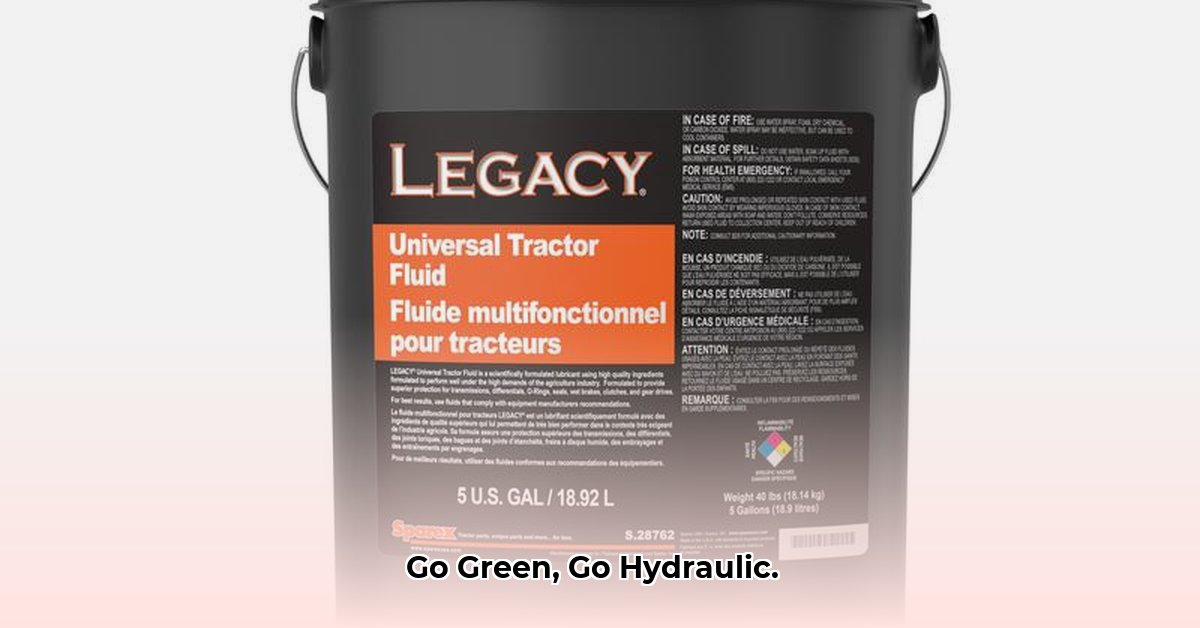
Understanding Tractor Hydraulic Oils and Sustainability
Maintaining peak tractor performance is crucial for a successful harvest. A significant factor in this is using the right hydraulic oil. This guide provides actionable steps for selecting and managing tractor hydraulic oil, emphasizing environmentally friendly practices for sustainable agriculture. Did you know that the wrong oil can decrease your tractor's efficiency by up to 15%? For more in-depth information, check out this helpful resource.
Types of Tractor Hydraulic Oil
Several types of hydraulic oil cater to different needs and environmental concerns. The main categories are:
Mineral-based oils: These conventional oils are affordable and widely available. However, they have a shorter lifespan and possess a higher environmental impact due to slower biodegradability. They're also less resistant to extreme temperatures.
Synthetic oils: Offering superior performance and longevity, synthetic oils excel in extreme temperatures. They provide better protection for your tractor's hydraulic components. The trade-off is the higher cost.
Biodegradable oils: Designed to break down naturally, biodegradable oils minimize environmental impact. While a more sustainable choice, performance might vary, and they may be more expensive and less readily available.
Here's a comparison:
| Oil Type | Pros | Cons | Environmental Impact | Typical Cost (USD/gallon) |
|---|---|---|---|---|
| Mineral-Based | Affordable, widely available | Shorter lifespan, less environmentally friendly, temperature sensitive | High | $10 - $15 |
| Synthetic | Superior performance, longer life, better temperature range | More expensive | Moderate | $20 - $35 |
| Biodegradable | Environmentally friendly, breaks down naturally | Potentially higher cost, performance may vary, availability may be limited | Low | $25 - $45 |
The optimal choice depends on your budget, climate, workload, and sustainability goals.
Choosing the Right Hydraulic Oil
Selecting the appropriate oil is paramount for your tractor's health and efficiency. Follow these steps:
Consult Your Owner's Manual: Your tractor's manual specifies the recommended oil type and viscosity. Ignoring this could void your warranty.
Consider Climate and Workload: Extreme temperatures influence oil viscosity. Heavier oils are suitable for colder climates, while lighter oils are better for warmer conditions. Heavy workloads demand more frequent oil changes.
Prioritize Sustainability: Biodegradable oils are excellent for eco-conscious farmers, but verify their compatibility with your tractor's hydraulic system.
Understand API Classifications: The American Petroleum Institute (API) classifications indicate oil quality and performance. Choose oils meeting your tractor's specifications.
Proper Oil Handling and Maintenance
Safe handling and regular maintenance are vital for a long-lasting hydraulic system:
Safe Handling: Always wear protective gear (gloves and eye protection) and clean up spills immediately. Dispose of used oil responsibly according to local regulations. Never pour used oil directly onto the ground.
Regular Oil Changes: Adhere to the oil change intervals in your manual. Old oil dramatically increases wear and tear.
Filter Replacements: Replace hydraulic oil filters as recommended to prevent harmful contaminants from damaging the system.
Leak Prevention: Regularly inspect hydraulic lines and fittings for leaks; even small ones can cause significant damage.
Troubleshooting Common Hydraulic Problems
Addressing problems quickly minimizes damage and downtime:
Sluggish Response: Check oil levels; contamination or a faulty pump might be the cause.
Leaks: Locate the leak and repair or replace damaged parts immediately.
Overheating: Overheating can result from low oil levels, poor lubrication, or a failing cooling system. Consult a mechanic immediately.
Sustainability in Hydraulic Oil Choices
Choosing biodegradable hydraulic oil significantly contributes to sustainable farming. However, true sustainability encompasses the oil's entire lifecycle, from production to responsible disposal. This approach helps minimize your farm's carbon footprint. "Investing in biodegradable oils is not just about protecting the environment; it's also about securing the long-term health of our farmland," says Dr. Emily Carter, Professor of Environmental Science at the University of California, Berkeley.
Key Takeaways:
- Choosing the correct hydraulic oil is vital for tractor performance and longevity.
- Different oil types offer varying advantages and trade-offs.
- Regular maintenance and responsible disposal are essential for both equipment health and environmental sustainability.
Remember to always consult your owner's manual and seek professional help when necessary. This ensures your tractor operates efficiently while minimizing environmental impact.